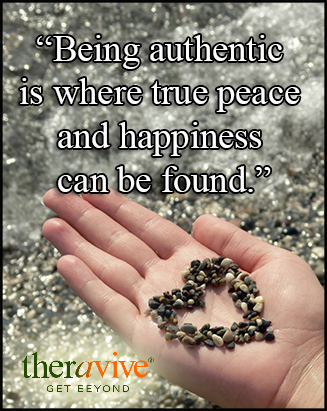 The Swiss Psychiatrist Carl Jung said, “The privilege of a lifetime is to become who you truly are.” (Good Reads, 2014). Personal authenticity is a journey. It’s a journey of first discovering and maybe rediscovering who you are, and then consistently sharing that with the world. You have probably heard people say things like “be real” and “just be yourself”, and ‘stay true to yourself”. This is common advice given to children and adults alike. It should be simple, right? Just be who you are. But, there is much more to it than that, and it takes real courage and strength to be your genuine self.
The Swiss Psychiatrist Carl Jung said, “The privilege of a lifetime is to become who you truly are.” (Good Reads, 2014). Personal authenticity is a journey. It’s a journey of first discovering and maybe rediscovering who you are, and then consistently sharing that with the world. You have probably heard people say things like “be real” and “just be yourself”, and ‘stay true to yourself”. This is common advice given to children and adults alike. It should be simple, right? Just be who you are. But, there is much more to it than that, and it takes real courage and strength to be your genuine self.
Recognizing Real
Authenticity is something you know when you see it, or feel it. It usually feels good to be around authentic people, but there can also be a bit of discomfort. They really know who they are, and they are not afraid to share it! To become more authentic yourself, you must first recognize it. In dictionary definitions, you will find authenticity described as “genuine”, “credible”, “real”, “truth”, and “believable” (Merriam-Webster, 2014). Observe a person who is authentic and genuine and you will also see some or all of these qualities:
· They are honest: They are truthful with themselves and with others, even when it’s very difficult.
· They are spontaneous: They can change their plans or change their mind with little difficulty.
· They are enthusiastic: They get excited and passionate about people and activities that are meaningful to them
· They take care of themselves: They know how to take good physical and emotional care of themselves. They do not tolerate abuse by others, and will often leave toxic situations.
· They are self-aware: They continuously work to really know and accept themselves. They are aware of their strengths and limitations. They are clear about their values and beliefs, but not rigid.
· They are congruent: They are who they say they are, and their behavior aligns with their beliefs and values.
· They are unselfconscious: They are self-aware and fully involved in the present moment, without excessive self-focus or self-consciousness. They are not worrying about how they are being perceived or if they are “doing it right”.
· They are confident in themselves and their abilities: They have self-confidence and know their strengths, but are also willing to be a beginner and try new things.
· They like themselves: They enjoy their own company and can spend long periods alone. They like and accept themselves exactly as they are, without harsh judgments. They can laugh at themselves. They don’t seek out or require approval or validation of their beliefs, opinions or interests.
· They are fully present in the moment: They become immersed in what they are doing. When you have a conversation with an authentic person, they are fully there with you.
· They allow others to be authentic: They accept individual differences, and are nonjudgmental. They allow you to be you, without pressuring you to agree with them or share their interests. They are genuinely interested in you.
It isn’t easy to be authentic. But once you understand what authenticity is, you can strive to be more genuine in your daily life and in your relationships with others.
 Becoming More Authentic
Becoming More Authentic
Every day there are pressures and temptations to abandon your authentic self and conform to what others want or expect you to be. The desire to be liked and fit in is a powerful one. But being authentic is where true peace and happiness can be found. Perhaps you have drifted away from your real self, or even forgotten who that really is. Discovering or re-discovering your authentic self takes time, but it is well worth the effort. Margery Williams captures this beautifully in her book, The Velveteen Rabbit.
“It doesn’t happen all at once. You become. It takes a long time. That’s why it doesn’t happen often to people who break easily, or have sharp edges, or who have to be carefully kept. Generally, by the time you are Real, most of your hair has been loved off, and your eyes drop out and you get loose in the joints and very shabby. But these things don’t matter at all, because once you are Real you can’t be ugly, except to people who don’t understand”.
“Once you are real you can’t become unreal again. It lasts forever” (Williams, 1983).
One of the most important steps on the journey to true authenticity is to discover who you are. This is a process, and there are a number of things you can do to increase your self-awareness and let your true self shine through.
· Write down and explore your thoughts and feelings.
· Create a collage that includes things you like, values you hold dear, people you admire, places you want to go, things that make you laugh, things that make you mad, and anything else that says “you”.
· Explore your personal beliefs and values.
· Notice when you are very happy or very content. What are you doing? Where are you? Who is with you? Try the same thing when you are unhappy.
· Notice what pushes your buttons and makes you angry or upset.
· Observe when you feel “off”, apathetic, or disconnected from people or situations.
· Be gentle, but honest, with yourself and your shortcomings.
· Strive to align your behavior with your beliefs and values.
· Practice awareness of your body and any tension in your body.
By discovering and staying connected to your authentic self, you come from a place of genuine clarity. Remember, this takes time, and there are some risks that come from living an authentic life. You may have to leave some people or situations behind. There may be pressure from others who don’t like, understand, or approve of the real you. That’s okay. No one can bring what you bring to life. You are unique. Living from your truth and authenticity isn’t always easy, but it will be the best gift you ever give to yourself, and to the world around you.
_________________________________________________________________________________________________________________________________
Good Reads. (2014). Quotes About Authenticity. Retrieved May 24, 2014, from http://www.goodreads.com/quotes/tag/authenticity
Merriam Webster. (2014). Retrieved May 21, 2014, from http://www.merriam-webster.com/
Williams-Bianco, M., & Atkinson, A. (1983). The Velveteen Rabbit. New York: Alfred A. Knopf.